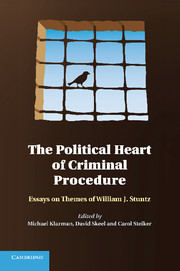Book contents
- Frontmatter
- Contents
- Contributor List
- Introduction: Appreciating Bill Stuntz
- Part I The Political Economy of Substantive Criminal Law
- 1 The Political Economy of Capital Punishment
- 2 Bill Stuntz and the Principal–Agent Problem in American Criminal Law
- 3 Overcriminalization for Lack of Better Options: A Celebration of Bill Stuntz
- 4 Stealing Bill Stuntz
- Part II Police Investigations
- Part III Emotion, Discretion, and the Judicial Role
- Index
- References
3 - Overcriminalization for Lack of Better Options: A Celebration of Bill Stuntz
Published online by Cambridge University Press: 05 March 2012
- Frontmatter
- Contents
- Contributor List
- Introduction: Appreciating Bill Stuntz
- Part I The Political Economy of Substantive Criminal Law
- 1 The Political Economy of Capital Punishment
- 2 Bill Stuntz and the Principal–Agent Problem in American Criminal Law
- 3 Overcriminalization for Lack of Better Options: A Celebration of Bill Stuntz
- 4 Stealing Bill Stuntz
- Part II Police Investigations
- Part III Emotion, Discretion, and the Judicial Role
- Index
- References
Summary
The unity of Bill Stuntz's character – his profound integrity – makes it easy to move from a celebration of his friendship (which I’ve treasured since we first met back in 1985) to one of his scholarship, for creativity, wisdom, and humility are strengths not just of Bill himself but of his work. Even as his broad brush strokes have fundamentally advanced our understanding of the interplay between substantive criminal law, criminal procedure, and criminal justice institutions over time, Bill's work – like Bill himself – welcomes and endures sustained engagement. Humility is appropriate for me, too, as I offer some ruminations sparked by his scholarship. The academic's plight is to simultaneously worry about being uninteresting and about being wrong. My hope is to err on the side of error. My methodology here will be much the same as it has been in a lot of my other work: I seek to entertain Bill, and perhaps to bait him into telling me why I’m wrong.
As Bill has noted, “criminal law's breadth” – the sheer amount of conduct it subjects to penal sanctions – “has long been the starting point for virtually all the scholarship” in the field. Back in 2001, he powerfully laid out the agency problems at the heart of the “pathologies” that inappropriately expand the range and depth of American criminal law: “Legislators gain when they write criminal statutes in ways that benefit prosecutors. Prosecutors gain from statutes that enable them more easily to induce guilty pleas. Appellate courts lack the doctrinal tools to combat those tendencies.” Thereafter, Bill elaborated his model, distinguishing between federal and local political dynamics and explaining how the loss of local democratic control over the criminal justice system has led to racial inequality in criminal justice outcomes.
- Type
- Chapter
- Information
- The Political Heart of Criminal ProcedureEssays on Themes of William J. Stuntz, pp. 64 - 86Publisher: Cambridge University PressPrint publication year: 2011
References
- 2
- Cited by



